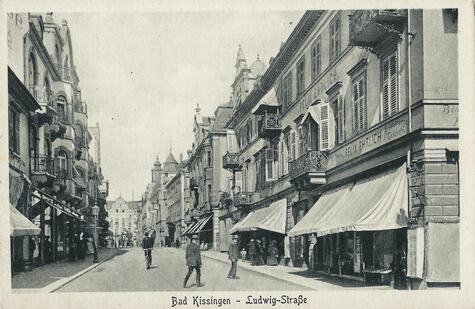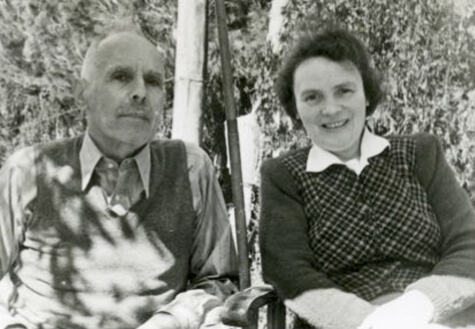personal data
Ehrlich Ludwig
Parents: Felix and Clara Ehrlich née Oppenheim
Siblings: Else, Paul, Franz, Martha, Gustav, Friedel
Spouse: Margarete née Efrem
Kinder: Suse, Felix (Phil), Hans Josef (Joske)
Ludwigstraße 17 (now 10)
November 1938 emigrated to London via Toulouse (January 1939);
1945 emigrated to Palestine
biography
Ludwig Ehrlich came from a long-established Jewish merchants’ family. His grandfather Samuel Ehrlich had been given the license for cloth trading in 1841 and had later opened a textile shop in Obere Marktstrasse. His son Felix Ehrlich had further expanded the family business and was awarded the title of “Royal Bavarian Supplier of the Court”. Since 1887, he ran a flourishing fashion shop at the corner of Ludwigstrasse and Kurhausstrasse.
After Ludwig Ehrlich’s marriage to Clara Oppenheim, the oldest child was born on February 27, 1883. After attending Elementary School, he entered Kissingen Realschule in September 1893 which he successfully graduated from in July 1899. After completing his apprenticeship with Firma Hirsch in Brussels, he worked in various trading houses to complete his economic education. In 1914, he married Margarete Efrem who came from Bernstadt in Silesia. After his father’s death he took on his father’s business in 1918 together with his brother Franz. From then on it was simply called “Modehaus Felix Ehrlich” in 1925.
Just like his brother Franz, Ludwig Ehrlich helped shape the life in the spa town. “For example, Ludwig Ehrlich was the secretary of the Voluntary Fire Brigade and … a member of Bad Kissingen’s citizens’ militia that had been founded in May 1919 as a means of protecting the citizens against any upheavals of supporters of the ‘Räterepublik’ (republic governed by workers’ councils) … The Ehrlichs felt attached to Jewish traditions in a cosmopolitan and liberal manner … The family heads were very liberal. Nevertheless, they filled important posts in the Community such as treasurer (Gabbai), member of the Burial Brotherhood (Chewra Kaddisha) and other charitable institutions of the Jewish Community. Contrary to the orthodox rules, the Ehrlichs’ business was also open on Sabbath. They adapted to the wishes of their mostly non-Jewish customers and closed their shop on Sunday.” (H.J. Beck, Kissingen war unsere Heimat, p. 583ff.)
After the Nazi seizure of power, the economic situation of the business deteriorated because of harassment and boycotts. In 1938, Kissingen authorities forced Ludwig Ehrlich to hand over his business to Martin Rottmann, the owner of a similar but smaller shop. “He was no Nazi but took over the shop with all of its inventory and my parents were paid a ridiculous sum for this “sale” that they divided into the six families of the siblings”. (Joske Ereli, p. 64)
They owe it to their grandson Menachem that Ludwig and his wife left Bad Kissingen just in time: In November 1938, their daughter Suse and her husband Asahel went to Toulouse with their boy Menachem to get a training in agriculture. “In the family the story is running how Menachem saved his grandparents. In November 1938, my parents decided to go to Toulouse to visit their first grandchild Menachem, who had been born in 1937. It was a convenient opportunity for them as the journey to Palestine was too far. They set out to France in the night from November 9 to 10, 1938 – “Kristallnacht” (Pogrom Night). If the story my mother told me is true, then that was the first time for my father to prove his sense: When they were about to change trains in the station of Cologne, there was an announcement: “Herr Ehrlich – to the phone!” In those days, SS tailed Jews, especially members of the upper class, to keep them and their possessions in Germany. My father didn’t comply, didn’t go to the phone but continued their journey as planned. I don’t remember if the call came from out caretaker Hofmann or our cook at home. In any case, the message had been: Don’t return, the SS is looking for you, they have turned the house and the shop upside down … My parents didn’t return to Germany and thus the grandson saved his grandparents” (Joske Ereli, p. 66f.).
Some weeks later , in February 1939, Ludwig and Grete continued their journey to England where they were generously supported by Uncle Ludi like many other members of the family (Uncle Ludi was Felix Ehrlich’s brother who had acquired a big fortune as the proprietor of a mine in South Africa and had moved to England at the turn of the century.)
After the war, both of them emigrated to their children in Givat Brenner/ Palestine in 1946. Ludwig Ehrlich, then already suffering from a heart disease died in 1948, his wife died several years later in 1952. (J. Ereli, p. 97f)
(Most of the information has been found in the autobiography of Ludwig Ehrlich’s son Joske Ereli.)

|

|
References
Joske Ereli, Von Hampi Ehrlich zu Jossl Ereli - Meine Lebensgeschichte
Hans-Jürgen Beck, Kissingen war unsere Heimat, Stand April 2017, S.583ff
Schülerakte Jack-Steinberger-Gymnasium
US Holocaust Memorial Museum/Holocaust Survivors…![]()
Photo credits
© Joske Ereli, Ein Gedi
Back